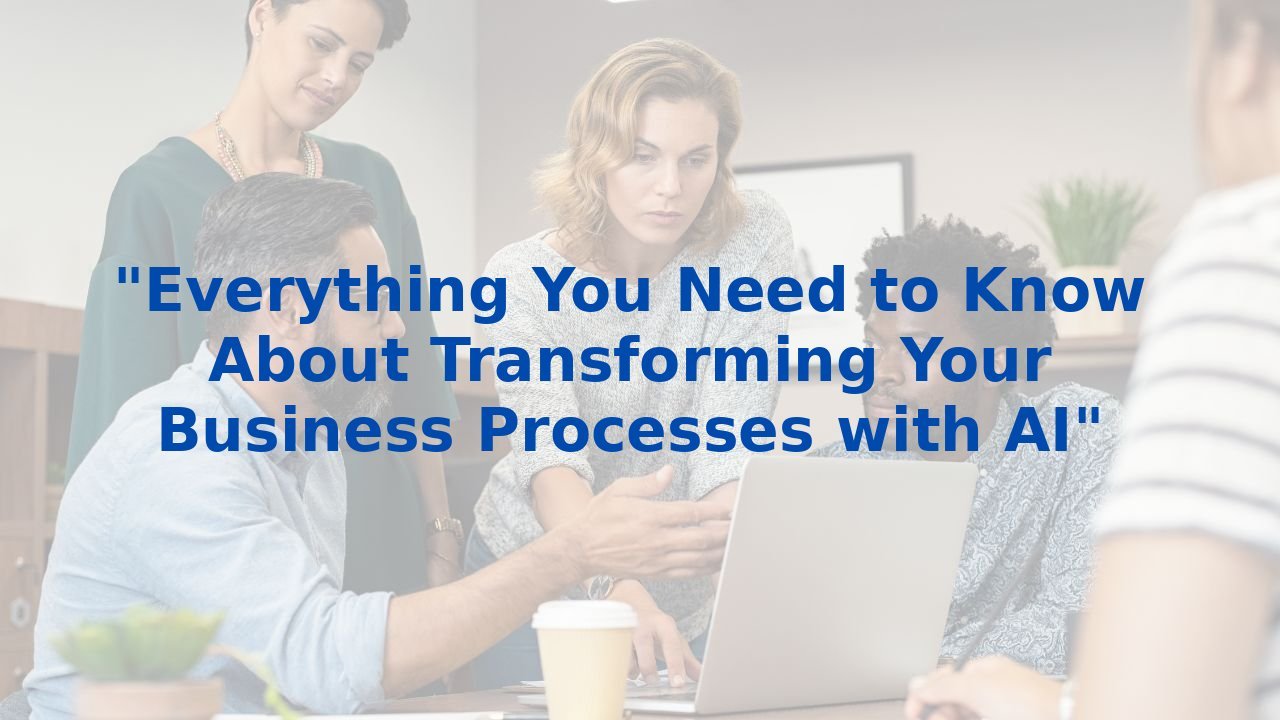A Guide To Enhancing Business Processes with AI: Unlocking Efficiency and Decision-Making
A Guide To Enhancing Business Processes with AI: Unlocking Efficiency and Decision-Making
In an age where competition is fierce and time is of the essence, businesses are turning to innovative solutions to streamline operations and make smarter decisions. Enter Artificial Intelligence (AI)—a game-changing technology that is not just a trend; it’s a necessity for organizations looking to enhance their processes and maintain a competitive edge. This guide will explore how AI can transform various business processes, focusing on the tangible benefits of integration and the critical role of employee training.
Process Optimization and Automation
Business Process Management (BPM) has undergone significant evolution since the late 1980s, with AI at the forefront of this shift. By embedding AI into BPM, organizations can experience faster results, improved decision-making, and enhanced operational efficiency. One of AI's standout capabilities is process simulation, wherein historical data is analyzed to uncover patterns and dependencies. This allows businesses to visualize different scenarios and optimize processes based on real-time scenarios, leading to reduced costs and faster lead times.
Real-Time Monitoring and Process Mining
AI-driven process mining provides organizations with a significant advantage in maintaining oversight of their operations. It empowers businesses to monitor processes in real-time, ensuring they stay informed about status changes and potential issues. With the ability to extract insights from system logs, companies can quickly identify bottlenecks, enabling them to implement timely solutions that drive efficiency. This proactive approach to process management not only saves time and resources but also characterizes a forward-thinking organization ready to embrace change.
Automating Routine Tasks
Routine tasks can often drown employees in manual, repetitive activities that detract from their strategic value. AI steps in as a champion of efficiency by automating these tasks. Intelligent Document Processing (IDP) leverages AI to transform documents into usable data with minimal human intervention, reducing errors and freeing up valuable employee time. Beyond document processing, AI can streamline customer service inquiries and data entry tasks, allowing teams to focus on what truly matters—strategic initiatives that drive growth.
Enhancing Decision-Making
The role of decision-making within organizations has become increasingly complex. AI serves as an invaluable ally in this aspect, synthesizing vast amounts of structured and unstructured data to provide comprehensive insights. It empowers decision-makers with information to consider multiple scenarios and risks, ultimately leading to more informed and confident decisions. Enhanced decision-making is not merely about speed; it’s about foresight and preparation for what lies ahead.
Predictive Analytics and Risk Management
AI enables organizations to harness the power of predictive analytics, forecasting outcomes based on historical data. This capability holds immense value as it allows businesses to identify and address potential bottlenecks before they escalate into issues. As market demands fluctuate, companies equipped with AI's predictive insights can pivot, ensuring they remain agile and responsive to change. Moreover, the foresight provided by AI plays a crucial role in risk management, enabling proactive measures that prevent workflow disruptions.
Customer Service Optimization
In a world driven by rapid communication, AI transforms the customer service landscape. AI applications—from chatbots that handle basic inquiries to advanced analytics that sift through customer feedback—enable organizations to offer swift and accurate responses. By automating common customer concerns, businesses not only improve efficiency but significantly enhance the customer experience, fostering loyalty and trust.
Product Development and Content Generation
AI is proving to be an invaluable asset in product development. Innovative generative design software evaluates numerous designs against specific criteria, helping teams save time and resources on prototype development. Moreover, when it comes to content creation, AI streamlines the process, generating precise and engaging copy that meets the evolving needs of customers. In an environment where every second counts, these efficiency gains are crucial.
The Role of Employee Training in Leveraging AI
Integrating AI into business processes is an investment, but the true returns can only be realized through proper employee training. Understanding AI capabilities is essential; employees must grasp the technology’s potential to harness it without over-relying on mechanisms that may lead to complacency. Data analysis skills are equally important, as employees need to interpret the insights generated by AI for effective decision-making.
Furthermore, training in process mapping and automation empowers teams to utilize AI-generated data effectively. Organizations that invest in continuous improvement techniques ensure that BPM strategies adapt to changing environments, retaining their relevance and effectiveness.
Conclusion
Artificial Intelligence is not just about keeping pace; it’s about redefining what's possible. By enhancing business processes—from optimization and real-time monitoring to customer service and predictive analytics—AI unlocks a level of efficiency that can transform an organization’s future. However, the integration of AI is incomplete without a dedicated focus on training employees to utilize these systems effectively. By fostering understanding, developing analytical skills, and committing to continuous learning, businesses position themselves not just to survive, but to thrive in an ever-evolving landscape.
For more in-depth knowledge and resources on AI integration and training, consider exploring Complete AI Training, which offers a variety of courses designed to equip organizations with the necessary skills to harness AI effectively.



